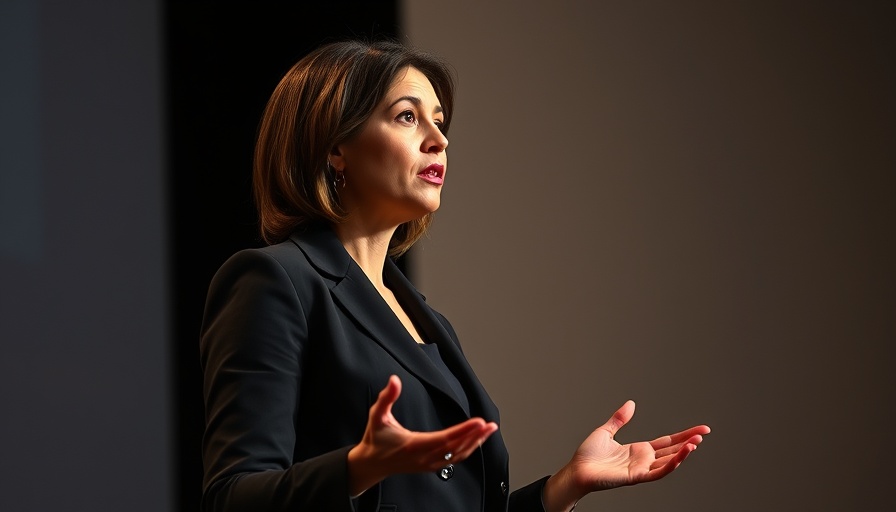
Recognizing the Invisible: The Importance of Disability Awareness in Healthcare
In recent years, there has been a growing recognition of the diversity of patient needs and the importance of tailored healthcare. As illustrated in the TEDx talk by Megan Morris, PhD, titled "How assumptions can hurt patients with disabilities," the healthcare system often fails to account for the specific requirements of individuals with disabilities. This oversight leads to misinformed medical decisions that can have serious consequences.
In 'How assumptions can hurt patients with disabilities', the discussion dives into the often overlooked challenges faced by patients with disabilities, exploring key insights that sparked deeper analysis on our end.
Understanding the Misconceptions Surrounding Disabilities
Dr. Morris shares a poignant example from her own life, spotlighting her uncle David, who experienced severe underappreciation of his capabilities due to his intellectual disability. Despite being physically restrained in a hospital setting, it was revealed that David had the cognitive ability to communicate his needs through simple gestures. This critical error stemmed from assumptions made by medical professionals based solely on his diagnosis rather than considering his personal abilities and preferences.
The Critical Need for Accommodations in Healthcare
Throughout the talk, Dr. Morris emphasizes the importance of asking patients about their disabilities and documenting those conversations. When healthcare providers create systems for inclusion, they not only comply with legal requirements, but they also create a more human-centered healthcare experience. In her research involving over 53 primary care clinics, Dr. Morris found that merely asking patients about necessary accommodations led to better health outcomes and improved patient satisfaction. Clear documentation helps healthcare teams identify gaps in care and make informed treatment decisions.
Counteracting Historical Context: The Eugenics Movement and Its Legacy
The historical context of how people with disabilities have been treated in society plays a significant role in current attitudes and practices. The eugenics movement of the early 20th century sought to filter out individuals deemed 'inferior,' which led to the institutionalization and forced sterilization of countless people with disabilities. This legacy still echoes today, as evidenced by rationing plans during the COVID-19 pandemic, where individuals with disabilities faced deprioritization in medical treatment. It's crucial for today's healthcare professionals to understand this background in order to create equitable systems moving forward.
Charting a Path Forward: Innovative Approaches to Patient Care
As we navigate an increasingly complex healthcare landscape shaped by technology and innovation, we must keep the needs of patients with disabilities at the forefront of our minds. The incorporation of assistive technologies, communication devices, and personalized patient care plans can significantly enhance the quality of care for individuals like David. Healthcare providers are encouraged to leverage data-driven approaches and innovative solutions designed to improve accessibility and inclusivity in medical institutions.
Taking Action: How Every Professional Can Contribute
By fostering a culture of awareness and sensitivity toward the unique experiences of patients with disabilities, professionals across various fields can contribute to meaningful change. Simple actions, such as encouraging open communication about disability and advocating for proper accommodations, can lead to transformative outcomes. The responsibility lies with all of us to ensure that every patient is seen, valued, and given the care they deserve.
The Call for Change in Healthcare Documentation
As highlighted by Dr. Morris, effective change in the healthcare system begins with improved documentation practices. Ensuring that healthcare teams are informed about a patient’s disability and the unique aspects of their lived experience can enhance care quality. We must engage stakeholders across the healthcare spectrum—from medical professionals to educational technologists—to facilitate this vital shift in practice.
Ultimately, recognizing the contributions and value of patients with disabilities is not just a matter of ethics; it is a pathway to enhancing healthcare for all. As we reflect on David's life and the lessons drawn from it, we are reminded of our social responsibility to advocate for inclusivity, equality, and dignity within the healthcare system.
For healthcare professionals eager to make a lasting impact, it is imperative to engage with patients on a deeper level and understand their individual stories, akin to the heartfelt messages shared by the children in David's Sunday school class.
 Add Row
Add Row  Add
Add 




Write A Comment